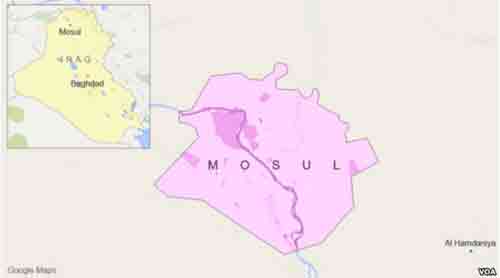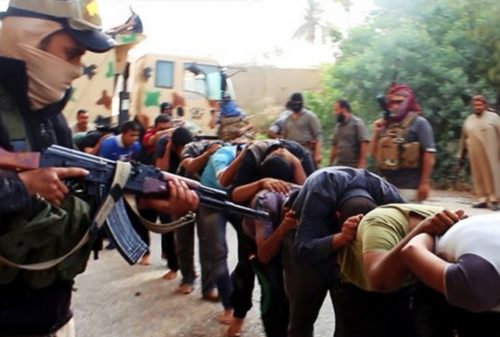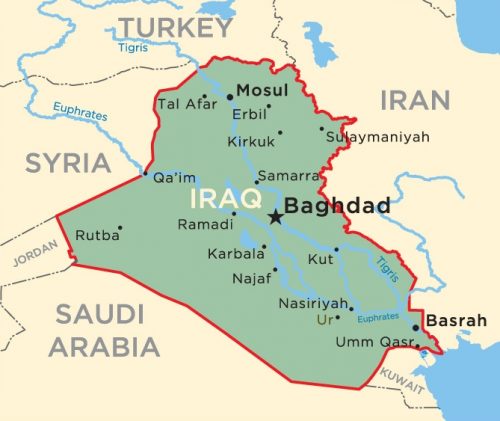 CAIRO-The U.N. Security Council called an emergency meeting on Iraq, where Islamic extremists seized more northern territory Thursday.
CAIRO-The U.N. Security Council called an emergency meeting on Iraq, where Islamic extremists seized more northern territory Thursday.
The United States is also working to sendhumanitarian assistance to the war zone, but senior officials say no American military action in Iraq is under consideration.
Tens of thousands of people have been displaced by the latest fighting, in which militants from the group known as the Islamic State (formerly ISIL) captured Iraq’s largest dam, a crucial source of water and electricity for millions of people in and around Mosul.
The militants also overran several predominantly Christian towns in the north.
The dam provides crucial water and electricity to millions of residents in the main northern city of Mosul. The militants overran Mosul on June 10. Kurdish forces in northern Iraq claim they still control the facility.
At the White House Thursday, President Barack Obama met with his national-security team about the growing Iraq crisis.
White House spokesman Josh Earnest said the Islamic fighters in northern Iraq have displayed a “callous disregard” for human rights.
Little warning
The overnight advance caught many Christian families by surprise, driving them from their homes with little warning and little chance to gather possessions.
Pope Francis appealed to the international community to help end the “humanitarian tragedy” in the country.
As Islamic State militants grabbed control of areas that had been under the protection of Kurdish Peshmerga fighters, the Kurdistan Regional Government appealed for support in its efforts to counter the extremists.
“It is now time for the international community to step forward, urgently, and provide the KRG with humanitarian assistance and military support, particularly air support,” Kurdish Minister Falah Mustafa said on the KRG’s website.
Islamic State
Known as the Islamic State, the Sunni extremists have already taken over large swathes of territory in northwestern Iraq and neighboring Syria. The group has imposed a strict form of Islamic law in the area, enforced through beheadings, amputations and crucifixions.
Considered more extremist than al-Qaida, the Islamic State has also threatened to capture the capital, Baghdad.
Witnesses said Islamic militants carried out an overnight offensive near the semi-autonomous Kurdish region of Iraq, seizing several towns, including Qaraqosh and Tal Kayf, which have large Christian populations.
They also have captured two oilfields near the Syrian and Turkish borders.
Chaldean Archbishop Joseph Thomas told the French news agency AFP that “tens of thousands of terrified (Christians) are being displaced as we speak, it cannot be described.”
He added that their towns had been “emptied of their original residents and were now under the control of (IS) militants.” He called on the U.N. Security Council to “intervene immediately.”
Hundreds feared dead
Amnesty International said access is impossible to areas under IS control, and in surrounding areas where fighting with Kurdish forces is ongoing.
Amnesty also reported that hundreds of civilians from Sinjar are feared feared dead or abducted after they were attacked by IS militants.
Jabber Yawar, the head of the Kurdish Peshmerga militia, insisted that the Islamic State’s attack caught his men by surprise because it took place in a lightly defended area.
Yawar said it is well known that the area around Sinjar and Zumar are geographically wide expanses that are not well defended and have relatively few Peshmerga fighters for the lands they are defending.
He said that before the June retreat of Iraqi government forces from Mosul, Peshmerga fighters jointly patrolled 1,000 kilometers of territory with them.
Yawar added that cooperation with the Iraqi military had resumed within the past few days after Prime Minister Nouri al-Maliki offered air cover to Kurdish fighters.
He noted that conditions were desperate for thousands of Yazidi refugees stranded in the Sinjar Mountains since Sunday.
A female Iraqi lawmaker from Kurdistan broke down and began sobbing on the floor of parliament, urging the body to intervene to help thousands of Yazidi refugees who fled to the Sinjar Mountains over the weekend and were in need of food, water and shelter.
Meanwhile, as the Iraqi parliament met Thursday to discuss who should be country’s next prime minister, lawmakers quarreled over parliamentary procedure and the use of mobile phones inside the chamber.
Outgoing Prime Minister Maliki insisted in his weekly television address Wednesday that parliament “must follow the constitution” and reappoint him to the post, or it would “open the gates of Hell,” and allow “foreign states to intervene in Iraq.”
Top Shi’ite religious leaders and members of Maliki’s own political bloc are urging him to step aside.
Baghdad suicide bombing
A suicide bomber driving a car killed 14 people in a Shi’ite area of Baghdad on Thursday, police and medical sources said.
The attack came while Islamic State Sunni militants pressed ahead with an offensive in northern Iraq that routed Kurdish forces and alarmed the Baghdad government and regional powers.
The group has previously claimed responsibility for bombings in Baghdad.








